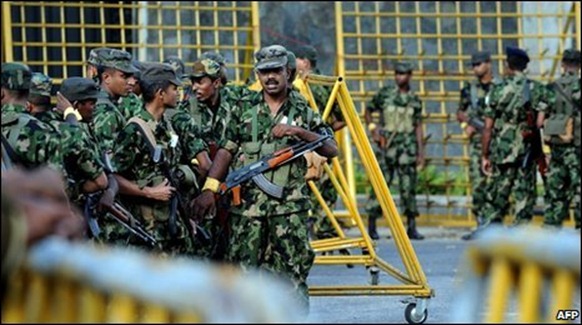 In the lobby of the Cinnamon Lakeside Hotel, the pianist played, Japanese tourists took photos and waiters glided by with the trays for high tea.
In the lobby of the Cinnamon Lakeside Hotel, the pianist played, Japanese tourists took photos and waiters glided by with the trays for high tea.
Later, a wedding reception gathered to enjoy the ambience of Colombo’s newest five-star.
But, outside, soldiers armed to the teeth swarmed up to those coming and going, checking every person and every single vehicle.
Gen Sarath Fonseka was inside, and the authorities, with their candidate President Mahinda Rajapaksa taking a commanding electoral lead, were clearly trying to prove something to him. Quite what, however, remained obscure.
In the small hours of Wednesday morning, the military spokesman said he knew nothing of the enhanced security at the Lakeside.
If it existed, he said, it must be because people in the hotel were planning "sabotage activities".
Preventative presence
Later he said there were 400 people with the general, including military deserters, who must surrender.
But the defence secretary said the soldiers at the hotel were simply part of a nationwide effort to prevent post-electoral violence.
The stand-off continued – were they trying to prevent a coup? Or launch a coup? Or arrest Gen Fonseka?
By the afternoon, Gen Fonseka had summoned journalists – ensconced in this five-star prison for much of the day – and said he feared being assassinated, especially if his security detail were removed.
He also rejected the final election result, which gave Mr Rajapaksa a substantial victory. By now the president’s ecstatic supporters were already throwing firecrackers around in the streets.
But the general said there had been irregularities and rigging in some places, and that he would mount a legal challenge.
He said there were grounds to ask the elections commissioner, Dayananda Dissanayake, to annul the outcome of this historic post-war poll.
His reasons include the inability of many internally displaced Sri Lankan Tamils to cast their vote because of inadequate transport between camps and villages; and the alleged misuse of state resources by the president’s side, including the use of public funds for Mr Rajapaksa’s campaign and the state media’s partisanship against the general.
Independent monitoring groups back many of Gen Fonseka’s complaints, saying the infringements by the president’s side are unprecedented – despite the government’s denials of wrongdoing.
Leaving the country?
Mr Dissanayake, too, despite announcing the results, echoes the criticisms.
Throughout the campaign he said state media and other institutions were breaking the rules.
But it may be difficult for the general to present a strong case for annulment.
The margin of victory is much larger than many predicted, with Mr Rajapaksa getting more than six million votes, compared with just over four million for Gen Fonseka.
Also, despite many election day irregularities, there were not complaints of very wide-scale chaos or of vote-rigging on a large scale.
For him to be in a stronger position there would have to be proof of misdeeds on election day, well-informed sources in Colombo said.
There are, of course, many opponents of the president who feel disaffected by the whole violent election campaign. But could the general rally them to his support?
Late at night, Gen Fonseka finally left the hotel in a BMW and was not arrested. "Why should we persecute him?" asked Defence Secretary Gotabhaya Rajapaksa.
But the president’s brother said the authorities were concerned about allegations against them made by Gen Fonseka during the campaign.
From his home, the general who would be president spoke to the BBC again.
Fearful for his security, he plans to go temporarily abroad for a while, he said. But he said he would "not forget the people".
(For updates you can share with your friends, follow TNN on Facebook and Twitter )
